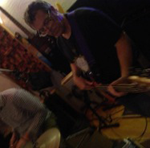Joe Bryan
Joe Bryan is a legend in the audio industry. Part scientist, coder, inventor, and craftsman, Joe is behind some of the most trusted and best sounding music gear of our time, including the award winning Universal Audio 2192 Master Digital Audio Interface. GuitarJack, the critically acclaimed audio interface for iOS devices, was the result of a partnership between Joe and Sonoma Wire Works. A new line of products based on Joe's sonic wizardry were released in 2015: GuitarJack Stage and StudioJack Mini. We are honored and grateful that such a brilliant innovator helped produce these products!
In simple terms, could you tell us exactly what your role is in developing GuitarJack?
I'm responsible for all the incredibly tiny fiddly bits inside the case. All the analog and digital electronics, plus the software that runs on the tiny processor in there. It all looks much bigger on my computer monitor running the CAD tools I use, but when I get the boards back from manufacturing, it's like I'm looking at them in the side mirror on my car that says "Objects are closer than they appear." I also have long rambling conversations with Dug on everything from guitars to lockless interprocess communications strategies, and I believe some of it might even be relevant. I'm hoping it's not in that "Your purpose may just be to serve as a warning to others" sort of way.
What were your goals in designing an interface for iOS?
The main goal was to product the absolute best sounding interface while staying within the power, size, and cost limits. Each of the three different audio circuits (guitar/instrument input, mic/line input, and headphone/line output) has separate, sometimes conflicting requirements. For example, you simply cannot run a guitar into a line input and expect it to sound very good. Anyone who's tried this with their soundcard or stereo knows this. The guitar input needs to be high impedance, and it needs some mojo. Line input has completely opposite requirements, it needs to be lower impedance, and it needs to be squeaky clean. GuitarJack is the only product on the market that does this properly.
What were your biggest challenges?
The main design challenge was minimizing analog noise. Guitar input is especially challenging because modern guitar amp settings can add a tremendous amount of gain, sometimes upwards of 80 dB, and this can easily raise the background noise well into clipping. The character of the noise is also really important. A quiet noise tone or periodic buzzing is much worse than random pink noise because our brains notice those kinds of signals. We easily exceeded the manufacturer's audio specs on many of the components by using circuit design, component selection, and circuit layout techniques developed while designing and building some of the world's very best professional audio products over the years.
What sets GuitarJack apart from its competition?
First, we care what it sounds like, and it's the best sounding interface you can get. Period. Second, it's built to last, it's easy to use, it looks great, and it has great specs. However, specs are never more important than the sound. The thing about good sound is that you don't really know what you're missing unless you've experienced it, and you won't experience it if you just buy cheap, bad-sounding gear.
If all someone has ever eaten is fast food, they won't have any idea what good food is supposed to taste like, and they won't know what they're missing. They'll judge things on their specs: the ingredients, how big it is, and how much it costs. But once they taste that organic capellini with fresh basil and tomato, it's unlikely canned spaghetti will remain the epitome of cuisine it used to be!
Once you hear a mix that just comes together and feels right, that inspires you to write another song, that motivates you to explore a new feeling, you'll never go back. You'll enter an entirely new world you never new existed!
Trying to judge sound quality by the specs is completely futile. The competitors' products that come close in specs actually sound far worse because the specs don't tell you what the guitar input *sounds* like, or what the mic input *sounds* like, or what the background noise *sounds* like.
It seems like mobile music production is being taken more seriously by the music community. Do you think GuitarJack has had a role in this?
Yes. All new technologies first start out as toys, then progress to becoming powerful tools. Taking it seriously is a self-fulfilling vision. When I invented the UAD plugins, people were constantly saying how plugins all sucked, and why would you want to do that anyway? Now look at them. Big knobs and real tube gear are awesome, but you can't always bring that gear where you want it. I design and build custom tube amps, and I've spent a lot of time in studios and on stage making or helping others make music, so I know what this stuff is supposed to do, what it's supposed to sound like, and how you want it to work.
The mobile platform is a revolution very much like the DSP plugin revolution that preceded it by 12 years when really high quality, high performance DSP became widely available, like when UA introduced the UAD-1. The impact will be no less significant.
Most people may not realize this, but the mobile devices they're carrying around in their pockets are supercomputers that easily outperform even the most powerful desktop CAD and gaming systems from just a decade ago. The only difference is they're tiny and don't interface to the outside world in traditional ways. They also don't sound like a squadron of bombers coming in for a landing!
Making those real-world connections for new mobile applications is exactly what GuitarJack is all about, and also why Sonoma Wire Works developed the Low Latency Audio system for Android devices.
Do you foresee a time when entire albums are recorded on mobile devices?
EQ, IQ, whatever it takes! The only rule is that there are no other rules. There are scratch takes recorded on $10 cassette decks that made it to the final mix of some of the very best songs ever recorded. It isn't the tools that make the inspiration, but it does help to have good tools available when the inspiration hits, and that's what mobile is all about.
Are you a musician yourself? If so, what do you play?
Music is a huge part of my life and always will be. I've been playing guitar and bass in various bands for longer than I can remember. I make a lot of my own gear, and I've built a studio in my house. One of my favorite things to do is get together with a group of like-minded musicians in the studio and explore new musical ideas. Call it jamming or improvisation, it's really one of the best things in life. I haven't really been into gigging since my roadie was abducted by aliens, though.
Any advice to young people interested in engineering for audio products?
Engineering audio products is a lot like being a chef or improvising music. You need to know your ingredients and tools inside-out and upside-down, you need to be fearless, and you need vision. If you don't know what it's used for or what it's supposed to sound like, then you need to go find out. It's also important to learn what specs mean, and how not to get fooled by them. A thorough understanding of the physiology and psychoacoustics of human audio perception, and a good electrical engineering and math background are essential. A healthy interest in historical gear is also important. You can learn a lot just by reading schematics and figuring out what was done and why. The book "Small Signal Audio Design" by Douglas Self is good, especially the sections about components. That's often overlooked in formal education programs.





